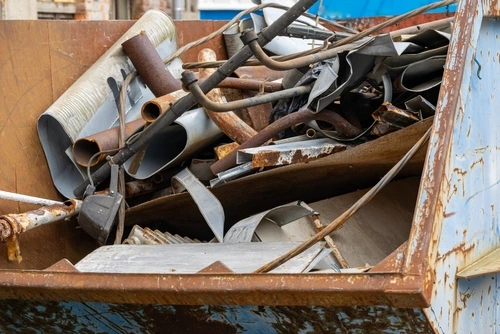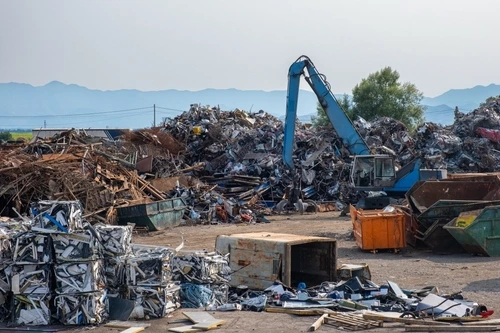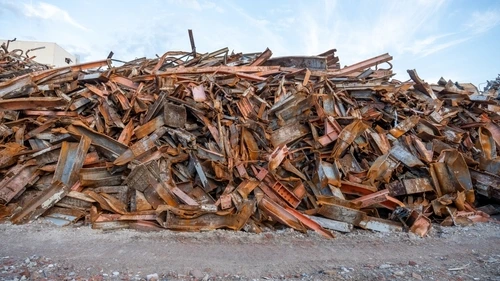Proper scrap metal waste management is essential for environmental sustainability and economic efficiency. Implementing effective methods can significantly reduce landfill use and resource wastage, contributing to a healthier planet. One efficient way to handle large volumes of scrap metal is by using a construction dumpster rental, which allows for easy disposal and potential recycling of the materials.
Different types of scrap metal, such as ferrous and non-ferrous metals, offer various recycling opportunities. Understanding these differences helps in sorting and processing the metals more effectively, ensuring they don’t end up as waste. Recycling metal not only conserves natural resources but also saves energy and reduces greenhouse gas emissions.
Implementing industry best practices and adhering to regulations ensures that scrap metal management is both efficient and safe. This involves proper collection and preparation, such as cleaning and separating metals, which maximizes recycling potential. Companies and individuals can make significant contributions by following these guidelines, thereby supporting sustainable waste management.
 Recycling scrap metal offers significant environmental and economic advantages. It plays a crucial role in energy savings, conservation of natural resources, and the reduction of harmful emissions.
Recycling scrap metal offers significant environmental and economic advantages. It plays a crucial role in energy savings, conservation of natural resources, and the reduction of harmful emissions.
 Effectively managing your scrap metal waste can result in environmental benefits and potential financial gains. This section provides detailed insights into where and how to recycle metals, strategies for maximizing revenue, and tips for setting up a recycling program.
Effectively managing your scrap metal waste can result in environmental benefits and potential financial gains. This section provides detailed insights into where and how to recycle metals, strategies for maximizing revenue, and tips for setting up a recycling program.
Key Takeaways
- Effective scrap metal management aids environmental sustainability and economic efficiency.
- Sorting and recycling scrap metal conserves resources and reduces energy consumption.
- Adhering to best practices and using tools like dumpster rentals streamlines disposal and recycling processes.
Understanding Scrap Metal and Recycling
Scrap metal recycling is pivotal for environmental sustainability. It helps in conserving natural resources, reducing energy consumption, and managing waste effectively.Types of Scrap Metal
Scrap metal is categorized into two main types: ferrous and non-ferrous metals. Ferrous metals include iron and steel, identifiable by their magnetic properties. Non-ferrous metals encompass aluminum, copper, lead, brass, and tin. These metals are not magnetic and tend to be more resistant to corrosion. Ferrous metals are commonly found in vehicles, construction materials, and household appliances. Non-ferrous metals are used in electrical wiring, batteries, and various consumer products. Identifying and separating these metals is crucial for efficient recycling.Importance of Recycling Metal
Recycling metal plays a crucial role in sustainable waste management. It conserves natural resources by limiting the need for new raw materials. For instance, recycling aluminum saves 95% of the energy required to produce it from bauxite ore. Moreover, metal recycling reduces greenhouse gas emissions and other pollutants since it uses less energy compared to mining and refining new metals. It also minimizes the amount of waste in landfills, promoting a cleaner environment. Economically, it generates jobs and supports a circular economy where materials are reused and repurposed.Recycling Process Overview
The recycling process begins with the collection of scrap metal from various sources like households, businesses, and industrial sites. Next, the metals are sorted into ferrous and non-ferrous categories. After sorting, the metals undergo processing, which involves shredding and melting. For instance, steel is melted in a furnace, while aluminum is melted at a recycling plant. The molten metal is then cooled and cast into new products. Finally, the recycled metal is ready to be used in manufacturing new goods. This closed-loop process ensures that metals are reused efficiently, reducing the need for new natural resources and supporting overall sustainability.Collection and Preparation of Scrap Metal
Efficient scrap metal management ensures recyclable materials are properly sorted, cleaned, and shredded, making them valuable resources. This involves careful separation, sorting to remove contaminants, and thorough preparation to improve recycling efficiency.Source Separation and Collection
To begin with, you should implement systematic separation of scrap metal at the source. This process involves collecting metal waste from various origins such as appliances, vehicles, and construction materials. Use designated bins for different types of metal. Clearly labeling these bins minimizes confusion and contamination. For instance, have separate containers for ferrous metals, non-ferrous metals, and electronic waste. Additionally, ensure these bins are placed in strategic locations within your facility or garage. This convenience encourages proper disposal. Collaborating with local scrap yards can also help streamline the collection process, as they often provide specialized containers and pickup services.Scrap Metal Sorting
Once collected, the next step is meticulous sorting. This involves categorizing metal types and removing any non-metal impurities. Magnetic separation is useful in distinguishing between ferrous and non-ferrous metals. For instance, use magnets to efficiently separate steel and iron from aluminum or copper. For electronic waste and other mixed materials, manual sorting is often necessary to identify specific valuable components and eliminate hazardous waste. Advanced sorting technologies, like sensors and automated machines, can accelerate this process. These technologies increase the sorting accuracy, ensuring that only pure, uncontaminated metals proceed to the recycling stage.Cleaning and Shredding
After sorting, thorough cleaning of the metal scraps is essential. Contaminants like oils, paints, and residues need to be removed to ensure high-quality recycling outcomes. You can use industrial cleaners for this task. Shredding follows the cleaning process. Shredders break down large metal pieces into smaller fragments, which are easier to handle and process in recycling facilities. This step is crucial for turning bulky items such as vehicle parts and large construction materials into manageable sizes. Using heavy-duty shredders, you can process materials ranging from appliances to structural beams efficiently. Shredded metals also have a higher surface area, which improves melting and recycling efficiency. By diligently collecting, sorting, and preparing scrap metal, you contribute significantly to scrap metal recycling, reducing metal waste and supporting environmental sustainability.Environmental and Economic Benefits
 Recycling scrap metal offers significant environmental and economic advantages. It plays a crucial role in energy savings, conservation of natural resources, and the reduction of harmful emissions.
Recycling scrap metal offers significant environmental and economic advantages. It plays a crucial role in energy savings, conservation of natural resources, and the reduction of harmful emissions.
Energy Savings
Recycling scrap metal consumes significantly less energy than producing new metal from raw materials. For example, recycling aluminum saves up to 95% of the energy required for making new aluminum from bauxite ore. Similarly, recycled steel saves about 60% of the energy needed for virgin steel production. These energy reductions also translate to decreased reliance on fossil fuels. The energy savings can mitigate the demand for coal, natural gas, and oil, directly impacting your energy bills and lowering operating costs in industrial processes.Conservation of Resources
By recycling scrap metal, you help conserve natural resources like iron ore, bauxite, and copper. Extracting these raw materials is resource-intensive and can cause long-term ecological damage, including habitat destruction and soil erosion. Recycling initiatives reduce the strain on these natural resources, ensuring their availability for future generations. Effective recycling programs make it easier for communities and businesses to manage waste sustainably, promoting long-term ecological balance and reducing material scarcity.Reduction of Emissions
Recycling scrap metal significantly lowers air pollution compared to traditional metal production methods. The process reduces greenhouse gas emissions associated with mining, refining, and manufacturing metals from raw materials. Lowering emissions not only improves air quality but also helps combat climate change. By reducing your carbon footprint, recycling programs contribute to global efforts aimed at environmental preservation. Every ton of recycled steel saves approximately 1.5 tons of carbon dioxide, illustrating a powerful impact on air quality and public health. In summary, the recycling of scrap metal is a win-win for both the environment and the economy. It offers tangible benefits in terms of energy savings, resource conservation, and emission reductions. These actions help create a more sustainable world while also contributing to economic growth and job creation.Regulations and Industry Standards
Effective scrap metal waste management requires adherence to specific regulations and industry standards. These include federal and state laws, safe disposal practices, and the certification of recyclers to ensure compliance and quality.Federal and State Regulations
Federal regulations play a pivotal role in scrap metal waste management. The Environmental Protection Agency (EPA) oversees the handling, storage, and disposal of hazardous waste. This includes materials that may be contaminated and need to be managed under the Resource Conservation and Recovery Act (RCRA). State laws can also impose additional requirements. These often involve compliance through programs like the Certified Unified Program Agency (CUPA), which enforces hazardous waste standards. For businesses, understanding both Federal and state regulations ensures adherence to best practices and reduces the risk of non-compliance.Safe Disposal Methods
Proper disposal of scrap metal waste is critical for environmental and public health. Federal regulations mandate that hazardous waste be processed through specific channels. Items like contaminated scrap metal must be disposed of in authorized landfills designed to handle hazardous materials. Businesses should follow best practices for safe disposal, including separation of hazardous and non-hazardous waste, and using certified recycling facilities. The Universal Waste rules also provide guidelines on how to manage certain hazardous waste materials like batteries and mercury-containing equipment.Recycler Certification
Certifications ensure that recyclers meet both federal and state standards. A certified recycler adheres to established quality and compliance protocols to manage scrap metal safely. Certification programs often require ongoing training and periodic audits to ensure compliance with regulatory and industry standards. Selecting a certified recycler helps businesses guarantee that their scrap metal is processed responsibly. It ensures safe disposal, reduces environmental impact, and aligns with federal compliance requirements and state laws. In summary, adhering to federal and state regulations, employing safe disposal methods, and ensuring recycler certification are critical components of effective scrap metal waste management.Practical Guidance for Individuals and Businesses
 Effectively managing your scrap metal waste can result in environmental benefits and potential financial gains. This section provides detailed insights into where and how to recycle metals, strategies for maximizing revenue, and tips for setting up a recycling program.
Effectively managing your scrap metal waste can result in environmental benefits and potential financial gains. This section provides detailed insights into where and how to recycle metals, strategies for maximizing revenue, and tips for setting up a recycling program.
How and Where to Recycle Metals
To begin recycling metals, identify common items such as appliances, aluminum cans, electronics, and vehicles. Local recycling centers and scrap metal recyclers are primary locations for processing these materials. You can also make use of curbside pickup services, where available. Establish the type of metals you have by separating ferrous (magnetic) from non-ferrous metals. Ensure that any metal waste is clean and stored properly to facilitate recycling. Consider donating usable items to organizations like Habitat for Humanity.Maximizing Scrap Metal Revenue
To maximize revenue from your scrap metal, sort and clean materials thoroughly. Removing non-metal components can increase the value of your scrap. Look for local scrap metal prices, as they can vary by location and demand. Selling directly to scrap metal recyclers may offer better rates compared to smaller recycling centers. Bulk selling can also be advantageous, as larger quantities often yield higher payouts. Developing relationships with reliable scrap buyers ensures consistent and fair transactions.Developing a Recycling Program
For businesses, establishing a structured recycling program can streamline operations. Start by creating clear guidelines on what metals can be reused, sold, or recycled. Designate storage areas for different types of scrap to avoid contamination and mix-ups. Schedule regular pickups with local recycling centers or scrap metal recyclers. Training staff on proper sorting and storage practices enhances program effectiveness. Additionally, identify key metrics such as the volume of scrap collected and revenue generated to track progress and optimize your recycling efforts.Frequently Asked Questions
This section covers key aspects of scrap metal waste management, focusing on proper recycling methods, regulations, and the operations of Sims Metal Management.How can scrap metal be properly recycled?
Proper recycling of scrap metal involves separating ferrous and non-ferrous metals. Ferrous metals contain iron and are magnetic, while non-ferrous metals do not. Utilize designated bins and follow local recycling guidelines to ensure metals are correctly sorted. Many facilities offer collection services, which can be arranged through companies like Ward.What are the regulations for scrap metal waste management?
Scrap metal waste management is regulated to ensure environmental safety and compliance with local laws. Regulations include proper disposal, pollution control, and documentation requirements. The U.S. Environmental Protection Agency provides guidelines on how to manage and recycle scrap metal responsibly, ensuring minimal environmental impact.Where are Sims Metal Management’s main operations located?
Sims Metal Management operates globally, with significant operations in North America, Europe, and Australasia. The company is known for its extensive network of processing facilities, including large-scale shredding plants and sophisticated material sorting operations, making it a leader in metal recycling.What types of metal waste can be included in standard recycling programs?
Standard recycling programs typically accept both ferrous and non-ferrous metals. Common types include steel, iron, copper, aluminum, and brass. Items such as old appliances, car parts, metal furniture, and electronics often qualify for recycling. Be sure to check local guidelines to see what specific materials are accepted.What is the process of managing scrap metal at recycling facilities?
At recycling facilities, scrap metal undergoes a sorting process to separate different types. Metals are then cleaned to remove contaminants and prepared for melting. The cleaned metals are melted in furnaces and cast into new shapes, forming raw materials for manufacturing. This process helps reduce waste and conserve natural resources.Who is responsible for the ownership and operation of Sims Metal Management?
Sims Metal Management is publicly owned and listed on the New York Stock Exchange and the Australian Securities Exchange. The company is overseen by a board of directors and managed by a team of experienced professionals. Their operations are committed to sustainability and innovation in metal recycling.RECENT BLOGS
 A Homeowner’s Guide to Flash Flood Preparation, Cleanup, and Long-Term Protection
A Homeowner’s Guide to Flash Flood Preparation, Cleanup, and Long-Term Protection
Date: May 27 ,2025
 Everything You Need to Know About Garbage Bin Rental: Sizes, Costs, and Practical Tips for Every Project
Everything You Need to Know About Garbage Bin Rental: Sizes, Costs, and Practical Tips for Every Project
Date: May 14 ,2025
 Safe Disposal Methods for Refrigerators: Recycling, Donation, and Removal Options
Safe Disposal Methods for Refrigerators: Recycling, Donation, and Removal Options
Date: April 29 ,2025
Our Reviews
LATEST BLOGS








